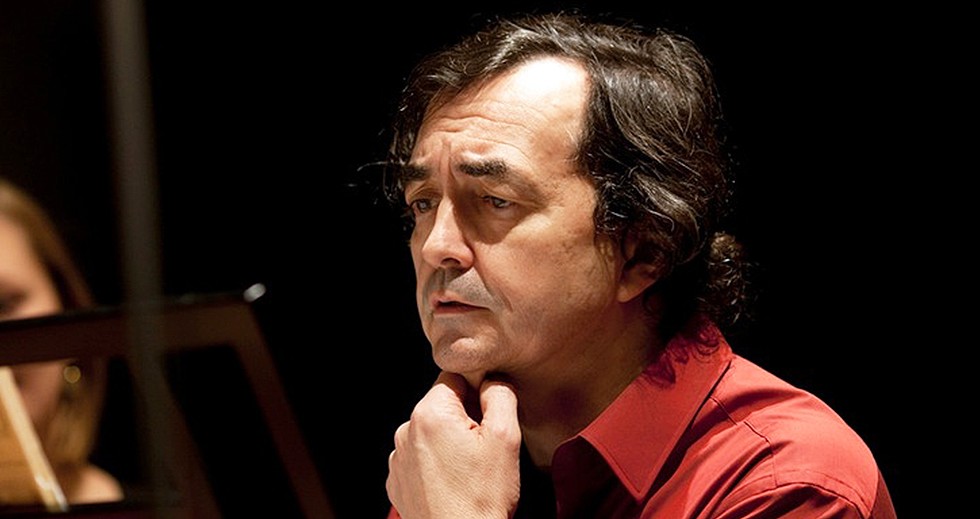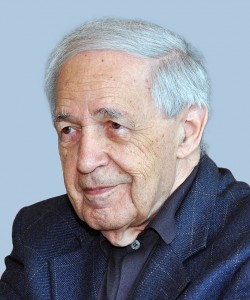
Pianist Pierre-Laurent Aimard bought his first Boulez score when he was only 12. Obviously, Aimard had a much different childhood than the rest of us — which helps to explain how at 16, he won first prize in the 1973 Messiaen Competition. Three years later, the composer-conductor appointed Aimard as the first solo pianist of Ensemble Intercontemporain, Boulez’s IRCAM-based chamber orchestra.
A longtime collaborator and close associate of the composer, Aimard will perform an all-Boulez recital March 15 at Symphony Center as part of celebrations to mark the maestro’s 90th birthday. He will be joined by pianist Tamara Stefanovich in a performance of seven Boulez keyboard works for one and two pianos.
“These are piano pieces composed by somebody who was a pianist, a very good pianist,” says Aimard of Boulez, the Chicago Symphony Orchestra’s Helen Regenstein condutor emeritus. “In these pieces, we see the evolution of a young composer with phenomenal powers of creation, and even in the earliest works, he shows a style that is completely personal, completely original and completely new.”
As a composer, performer and mentor, Boulez has left his mark on the music of his time, a major force in Western culture. Early on, when he was only 19, he presented himself to the legendary French composer Olivier Messiaen. “M. Boulez at my house at 9:30,” Messiaen wrote in his diary. “Likes modern music.” That has to be the understatement of the 20th century.
From the very start of his compositional life, even in his earliest pieces, Boulez demonstrated his uniqueness. “It is amazing to see how strongly himself he already is,” says Aimard, speaking about the composer’s earliest works. “And he is so strong and so radically himself that you don’t think he is influenced by this or that composer. His is the music of an avant-gardist – someone who composes in a completely new way.”
The seven pieces that Aimard and Stefanovich have programmed for their recital span several decades, the earliest being Notations (1945, with revisions to multiple movements in later years). Also on the program are Sonatas No. 1 (1946) and 2 (1948), movements from Sonata No. 3, Incises (1994/2001), une page d’ephemeride (2005) and Structures, Book II (1961).
“I have a story, a different relationship with each of these pieces,” says Aimard. “I have different memories with each of them and love them for different reasons. I think [Boulez] is somebody who tries to solve different problems with each of his compositions. Each of these pieces tells us something, and with each, we have a completely different composition.”
In one way or another all composers are influenced by their predecessors but with Boulez it is so hard to spot another’s fingerprints. He so transformed and digested the existing musical language that, even in his earliest works, you hear only Boulez. “This is what’s amazing,” Aimard says. “A young man 20 years old composes his first piano piece, and it’s already completely himself. It is remarkable!”
While growing up in Lyon, Aimard was encouraged to embrace all of music, not just the works of one composer or the music of a single era. His first teacher, Genevieve Lievre, was not a new-music specialist but an all-music generalist. “Everything in life is a chance, and I found the right person,” says Aimard. “She could play the piano but she was mostly a flute player who played organ, too.
“She was very open-minded. She gave me a musical education starting with the Baroque and up through the most recent pieces. She brought me recordings of new music and of music from different parts of the world, and she spoke to me about music and theater. She composed scores for theater, and she talked to me about many composers and musicians that she had met.
“She was completely up to date, and she shared with the very young man that I was all her passion and enthusiasm. It was normal for me to go to an orchestra concert on Sunday and hear a Brahms concerto and then during the week to hear Boulez or Stockhausen pieces and then go to the opera to hear Mozart or Wagner. The goal was not to produce a wonder child but an educated young guy who was open to the world.”
Jack Zimmerman, a recovering trombonist, is a Chicago-based writer and novelist.
